
The regulator wants members to keep their money longer with pension schemes or get paid in installments
Kampala, Uganda | JULIUS BUSINGE | The Uganda Retirements Benefits Regulatory Authority (URBRA) is in advanced stages of preparing a policy proposal for the ministry of finance to consider and convince retirees to keep their money with pension schemes beyond their retirement age.
The other component of the policy is to allow or convince retiring individuals not to get all their savings from the scheme.
This was revealed by Martin A. Nsubuga, the authority’s chief executive officer in an interview with The Independent on the sidelines of a workshop convened to discuss policy proposals to address issues of inadequate retirement benefits – aimed at combating old-age poverty at Imperial Royale Hotel on March 04.
It remains unclear whether savers will buy into this idea given that a section of them have been luring the government to pass laws to allow them access all their funds even before they clock the retirement age. Others have been calling for mid-term access for their funds to meet their respective expenditures. This proposal, however, is not entirely be new.
“There is a similar proposal being mooted under the NSSF Act but is not being appreciated well which is why we are thinking of other alternatives,” Nsubuga said.
He added that the policy proposal will be done as soon as possible in order to create a platform for discussion around it.
He also said that the policy would suggest that if one is moving from one employer – say from private sector or the NGO world to public service/government – they should be allowed not to withdraw their savings but instead keep it with the pension scheme so that the latter can invest it and pay a good return to the owner of the money (asset).

Nsubuga said that this proposal is important as it would prevent eligible members who qualify for age benefit and withdrawal benefit from suffering from old-age poverty.
“We have noted in this market that when a person retires and is given a lump sum [all their savings], they use it all in the first 3-5 years,” Nsubuga said, “…85% of the people who receive this money waste it yet the life expectancy today is 17 years in retirement…so what happens to the rest of the 12-15 years?”
“Is this the generation we want to build in this market for the middle class that we are talking about?” Nsubuga asked.
His ideas are related to the National Social Security Fund recent internal survey that established more than 70% of the beneficiaries were depleting their savings received from the Fund within two years, and most wished they had had an opportunity to receive their savings in installments.
The Fund also said 62% of their members aged between 45- 60 would consider the payment of their benefits in instalments rather than receiving them in a lump sum.
Nsubuga reiterated that the main goal of saving for retirement is to provide adequate income and prevent old-age poverty. In Uganda, he said, most people who are saving for retirement will most likely have less than 10% of their current monthly income when they retire, meaning that their accumulated retirement savings will remain inadequate.
This situation is attributable to a wide range of factors including, but not limited to; low contribution rates, low earnings, infrequent contributions, efficiency of managing retirement saving schemes and investment costs.
“Given the need for all savers to live a poverty-free retirement, it is important to chart ways of ensuring adequacy of retirement savings,” he said.
Fred Muhumuza, a senior economics lecturer at Makerere University, and researcher said that such a good plan requires savings incentives to motivate people to leave their money to grow after they have retired.
He said that the money should be invested by pension schemes in key sectors of the economy that they have convincingly carried out risk assessment plans to prevent loss of members’ funds.
He also said there should be platforms to convince young people to save for retirement instead of ‘eating’ all their income/savings and leaving nothing to survive on after retirement. He also urged pension schemes and their handlers to think of new investment options and present them to the regulator for approval as one way of growing members’ savings.
Mubbale Mugalya, the chairperson of the Fund Managers Association in Uganda, said matters savings have two categories of people – one that is chasing to grow cash flows and the other that tries to build wealth. In all aspects, Mugalya said, there is need to unlock one’s mindset to think deeply about making good investments in companies and other areas to grow their money.
“Opportunities to create wealth are much bigger than they have been ever before,” he said, “it is easy to start a company today, market it and list it on the stock market,” he added.
****
 The Independent Uganda: You get the Truth we Pay the Price
The Independent Uganda: You get the Truth we Pay the Price



